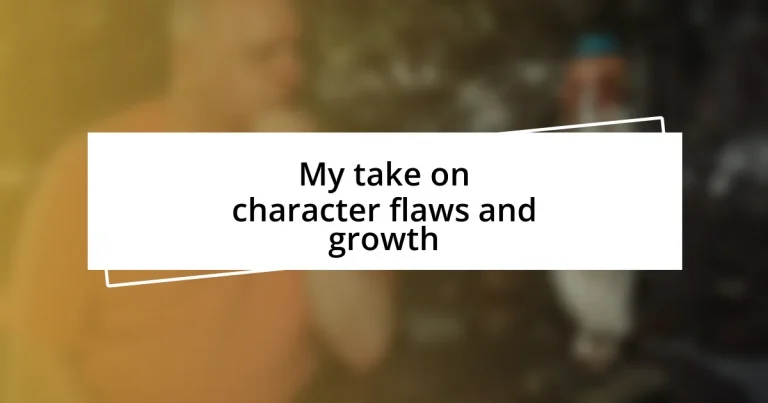Key takeaways:
- Character flaws, when acknowledged, can catalyze personal growth and emotional development by encouraging introspection and vulnerability.
- Confronting flaws through journaling, seeking feedback, and mindfulness can lead to insightful self-discovery and enhance personal relationships.
- Embracing flaws transforms perceived weaknesses into strengths, facilitating resilience and fostering deeper connections with others.
- Setting intentional goals to address flaws, like seeking feedback, enables a positive shift in mindset and promotes ongoing self-improvement.
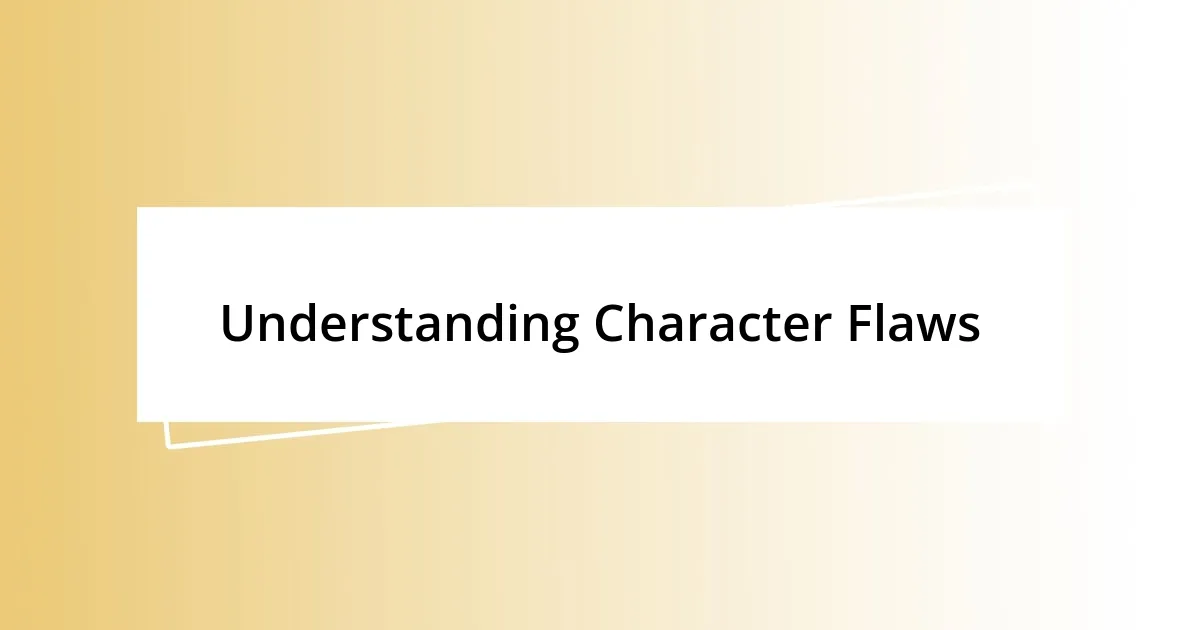
Understanding Character Flaws
Character flaws are often viewed negatively, yet I believe they are simply a part of our human experience. For instance, I remember a time when my fear of failure kept me from pursuing a promotion at work. This flaw made me question my abilities and led to regret, revealing how deeply interconnected our flaws can be with our decisions and emotional well-being.
It’s interesting how we often identify flaws in others while remaining blind to our own. I once had a friend who struggled with impatience, constantly rushing everyone around them. Observing this not only opened my eyes to their experience but also made me reflect on my tendency to overanalyze situations, which can be equally paralyzing. Have you ever noticed how a character flaw in someone else can serve as a mirror, revealing our own tendencies?
Moreover, understanding character flaws invites us to embrace our imperfections more openly. I’ve learned that vulnerability can be a source of growth. When I openly admitted to my procrastination, it not only felt liberating but also led me to adopt better time management strategies. How can acknowledging these flaws in ourselves propel us toward personal growth? It’s a powerful question that encourages introspection and ultimately drives change.
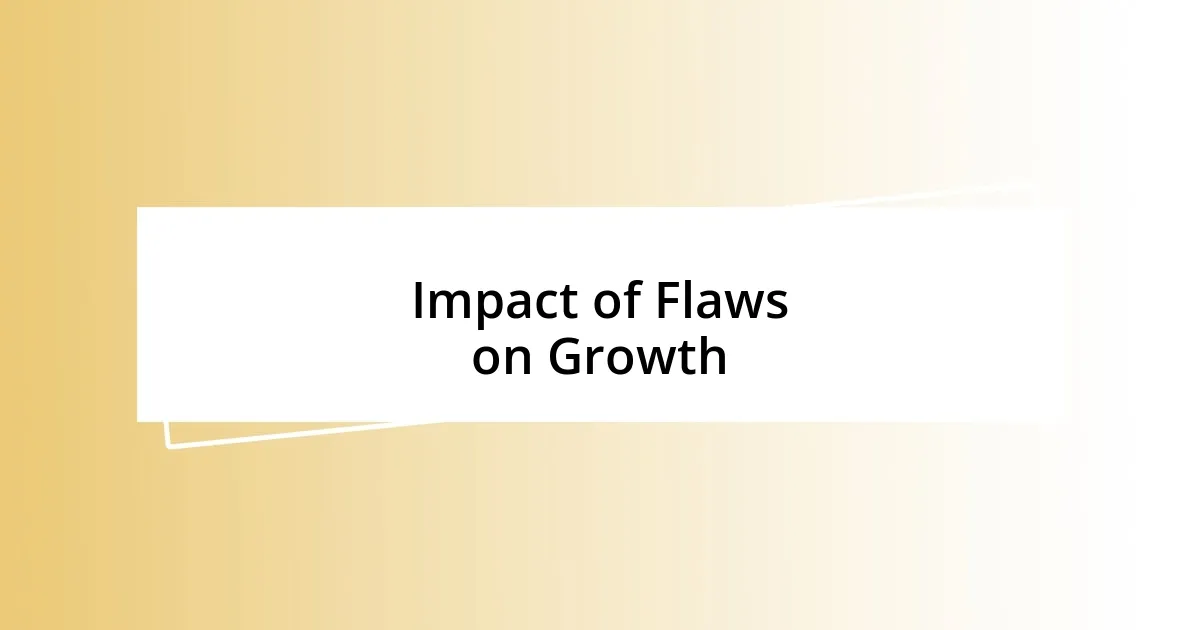
Impact of Flaws on Growth
Character flaws can serve as a catalyst for growth when we recognize and confront them. I recall a particularly tense moment in my life when my over-analytical nature prevented me from taking a leap that could have transformed my career. That fear, while frustrating, pushed me to develop a clearer decision-making process. It was almost like I had to unlearn some of my habits to embrace new opportunities.
In many ways, I view flaws as stepping stones rather than stumbling blocks. For instance, my tendency to be overly critical of myself often led me to improve my performance, but it also created a barrier between myself and happiness. Acknowledging this narrative in my life taught me the importance of balance, enabling me to strive for excellence without losing sight of enjoyment in the process.
Certain character flaws can reveal aspects of ourselves we might not want to face, but confronting them can lead to profound insights. I remember wrestling with my tendency to procrastinate, which sometimes left me feeling overwhelmed. Eventually, I decided to take small, actionable steps toward productivity, leading to a sense of accomplishment that I had previously believed was out of reach.
| Character Flaw | Impact on Growth |
|---|---|
| Fear of Failure | Encourages development of resilience and courage. |
| Over-Critical Nature | Fosters awareness of self-worth and emotional balance. |
| Procrastination | Leads to improved time management and productivity techniques. |

Identifying Your Own Flaws
Identifying your own flaws can be a difficult but necessary journey. A while ago, I sat down with a journal and began listing my patterns—things I often shrugged off as quirks. To my surprise, that simple act made me confront traits I had buried deep, like my reluctance to accept feedback. Realizing that could lead to stagnation was uncomfortable but enlightening.
Here are some strategies I found helpful in this self-discovery process:
- Journaling: Writing down your thoughts can reveal underlying patterns.
- Seeking Feedback: Ask friends or colleagues for honest insights—they often see what we don’t.
- Mindfulness Practices: Meditating helps create a space to notice recurring thoughts or behaviors without judgment.
- Reflection Questions: Regularly ask yourself questions like, “What frustrates me about others?” Often, it’s a mirror to our flaws.
- Professional Help: A therapist or coach can guide you in identifying and understanding your flaws better.
I recall a time when I confronted my habit of dismissing others’ opinions too quickly. At first, it felt defensive; I worried about appearing ignorant. Over time, I realized this flaw stifled collaboration and hindered my growth. Acknowledging that paved the way for more meaningful conversations and deeper connections with people around me. It’s fascinating how naming a flaw can lead to an array of positive changes, don’t you think?
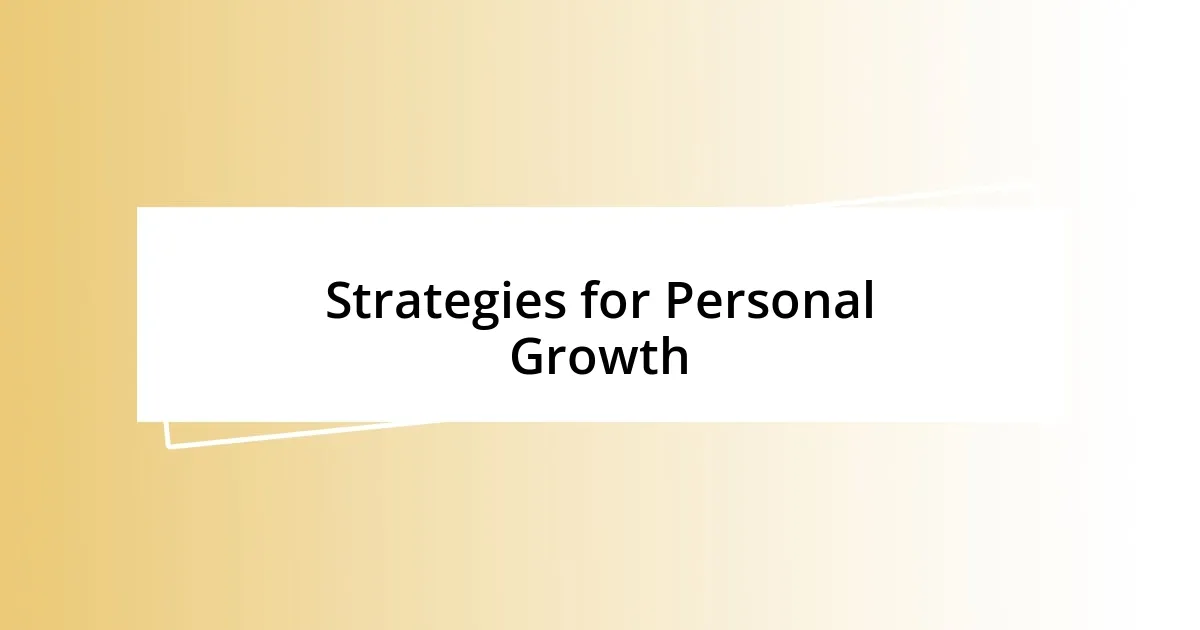
Strategies for Personal Growth
One effective strategy for personal growth is embracing vulnerability. I can recall a time when I hesitated to share my thoughts during team meetings, fearing judgment. It hit me that my silence was not just holding me back, but also depriving my colleagues of potential ideas. By allowing myself to be vulnerable, I sparked conversations that not only boosted my confidence but also improved team dynamics. Have you ever noticed how sharing your true self can encourage others to do the same?
Another approach is setting intentional goals that directly address our character flaws. I remember when I realized my difficulty in accepting criticism was hindering my career progress. To combat this, I set a specific goal: receive and actively seek out feedback from at least three people each month. This simple act transformed my mindset over time, turning critiques into opportunities for growth and reflection. By focusing on my openness to feedback, I gradually shifted from defensiveness to curiosity. What goals could you set to confront your flaws?
Lastly, cultivating a growth mindset can significantly aid our journey of self-improvement. I used to view failure as something negative—something to be avoided at all costs. However, when I began to see setbacks as learning moments, everything changed. I faced challenges with a renewed sense of purpose, no longer paralyzed by the fear of imperfection. This shift not only empowered my growth but also taught me resilience. Have you experienced a moment where reframing your perspective led to unexpected growth?
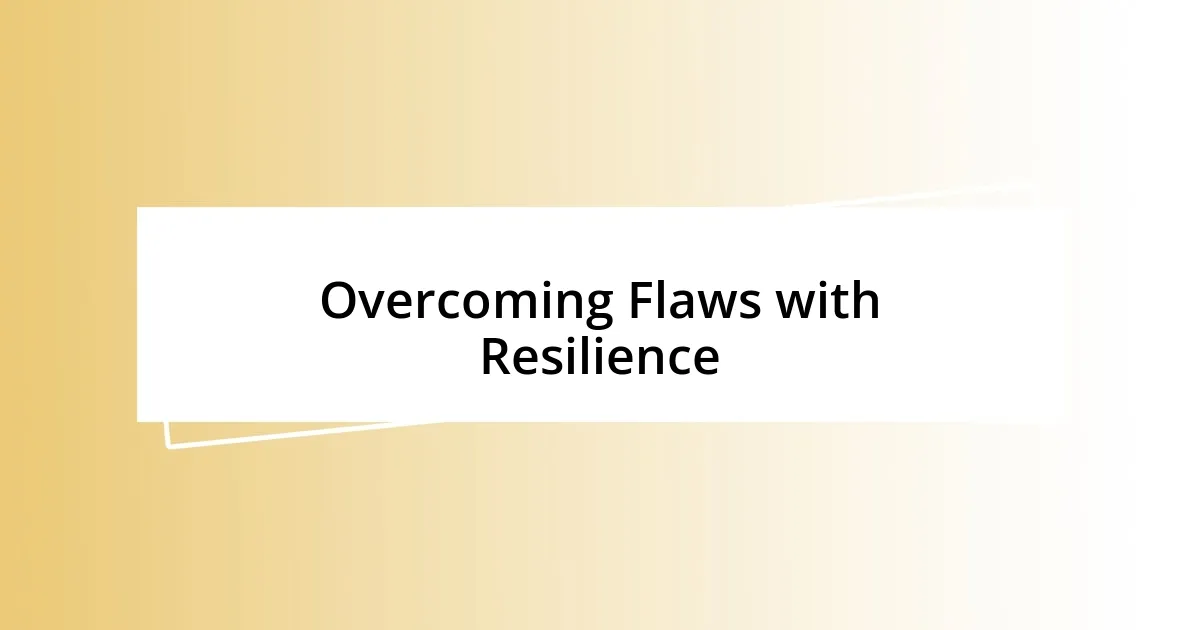
Overcoming Flaws with Resilience
Overcoming flaws with resilience is truly a journey that requires patience and self-compassion. I remember grappling with procrastination, often leaving things until the last minute out of fear of not doing them perfectly. One day, I decided to break down my tasks into smaller, manageable steps, reminding myself that progress—no matter how small—was still progress. This shift in perspective helped me build a sense of accomplishment, allowing me to develop resilience against my own tendencies.
Resilience isn’t just about bouncing back; it’s about evolving through our mistakes. I faced a situation in which I lost a major client due to my inability to handle feedback gracefully. Initially, it felt like the end of the world, plunging me into doubt and frustration. But, reflecting on that moment, I learned to see it as an opportunity for growth. By reaching out to seek clarity and understanding, I turned that setback into a lesson on communication. Have you ever turned a tough experience into a learning opportunity?
Moreover, it’s essential to recognize that resilience is often built through community and support. After my professional setback, I found myself surrounded by friends who encouraged me to share my feelings about failure. Their insights and shared experiences normalized my struggle, showing me that flaws don’t define us; rather, they provide rich ground for growth. This collective strength ignited a newfound determination in me, sparking a desire to confront my flaws with courage. How has your support network influenced your path to resilience?
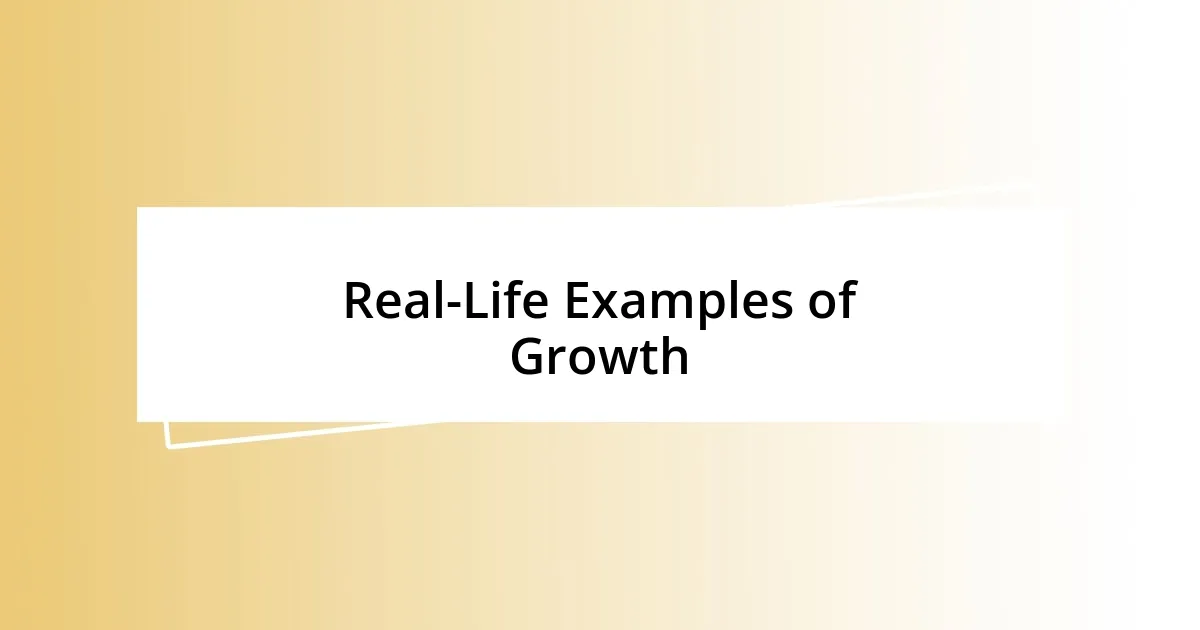
Real-Life Examples of Growth
I remember a close friend of mine who used to shy away from public speaking. Her fear of judgment kept her from pursuing opportunities that could showcase her talents. One day, she signed up for a local storytelling event, despite her anxiety. Watching her step up to the mic was a moment filled with vulnerability and courage. That night, she captivated the audience, embracing her imperfections and realizing that her voice mattered. Have you ever pushed through a fear and discovered a strength within you?
Then there’s my own journey with impatience. I’ve often found myself wanting immediate results, whether it was in my career or personal life. I recall a period when I was learning a new skill—playing the guitar. Initially, I was frustrated with my slow progress. However, I decided to alter my approach by celebrating small milestones, like mastering a chord or playing a simple song. This mindset shift transformed my experience, allowing me to enjoy the process rather than fixating solely on the outcome. How often do we overlook the beauty of small wins in our pursuit of growth?
Another powerful example comes from a colleague who struggled with perfectionism. It affected his productivity and stifled creativity. After receiving constructive feedback that highlighted his strengths well beyond just technical skills, he took a bold step. He decided to create and share projects that were intentionally “imperfect.” This act not only freed him from the shackles of perfectionism but also inspired his teammates to embrace their flaws. It was a compelling reminder that our journeys are enriched by authenticity. Have you ever found liberation in letting go of perfection?
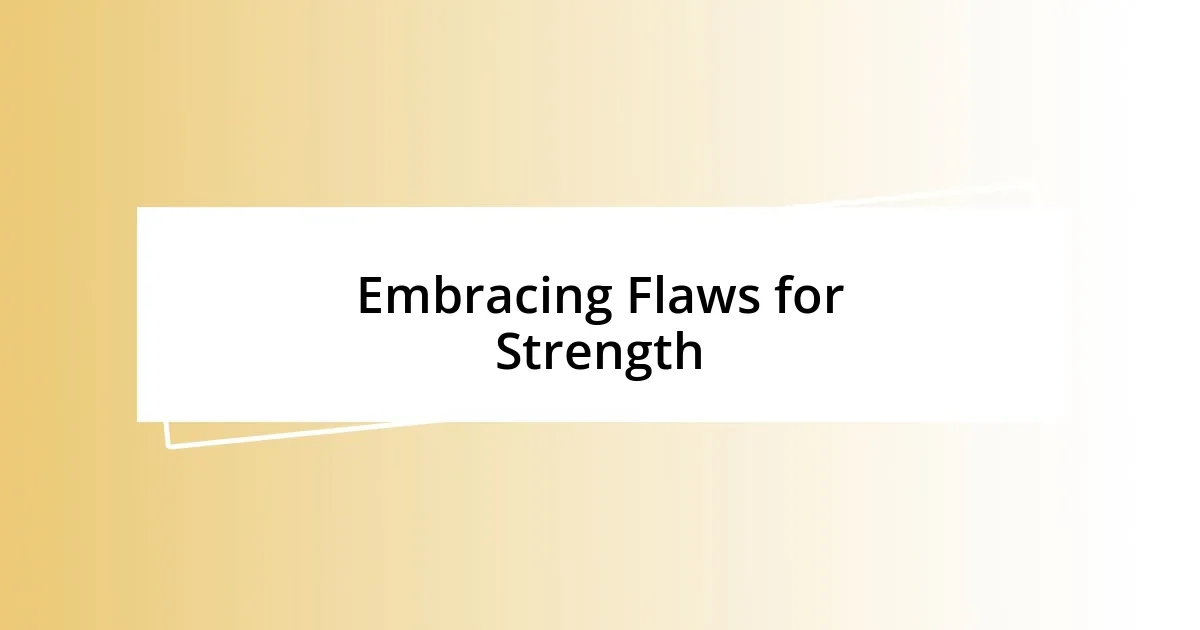
Embracing Flaws for Strength
Embracing our flaws can feel daunting, but it’s where our true strength often lies. I recall a time when I struggled with my tendency to overthink decisions. This made me hesitate and hold back from pursuing new opportunities. However, instead of fighting against it, I embraced that part of me. I started to see my overthinking as a form of curiosity, pushing myself to explore various possibilities. In acknowledging this flaw, I gained confidence that led me to make bolder choices. Isn’t it fascinating how just shifting our perspective can turn a perceived weakness into a source of strength?
There’s something profoundly liberating about accepting our imperfections. I met someone who openly shared her journey with anxiety, which once paralyzed her in social situations. Rather than hiding from it, she began sharing her experiences with others, discovering that many felt the same. This vulnerability not only fostered deep connections but also empowered her. It made me reflect—how often do we miss the chance to connect by pretending we’re flawless? Embracing our shortcomings can lay the foundation for genuine relationships, creating a supportive community where growth flourishes.
I find that the path to embracing flaws often involves taking small, intentional steps. When I first recognized my struggle with self-doubt, I committed to writing daily affirmations. It may sound simple, but those affirmations transformed my internal dialogue over time. I began to appreciate what I have to offer, even if it doesn’t align with societal standards of success. What if we all took a moment, each day, to acknowledge and even celebrate our flaws? Those moments of self-acceptance can propel us forward, reminding us that our unique characteristics are not burdens but rather badges of honor in our journey of growth.






